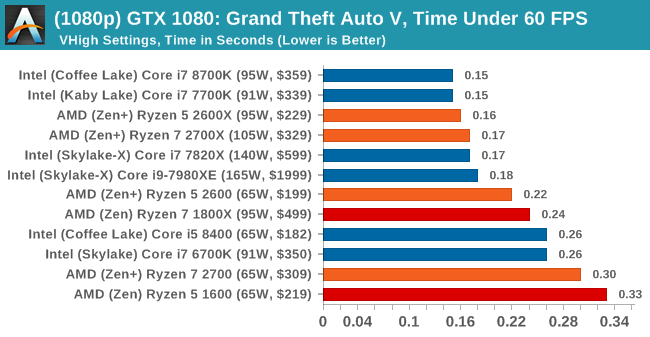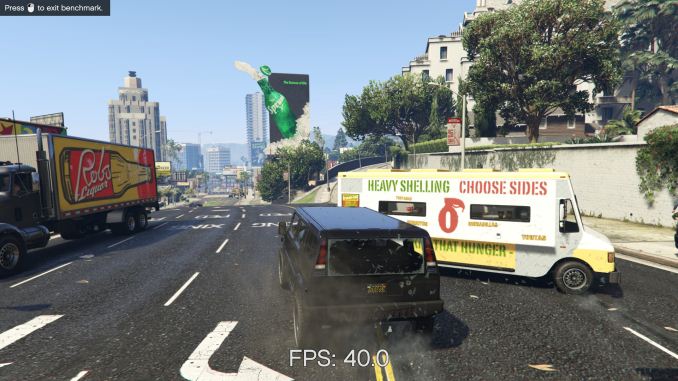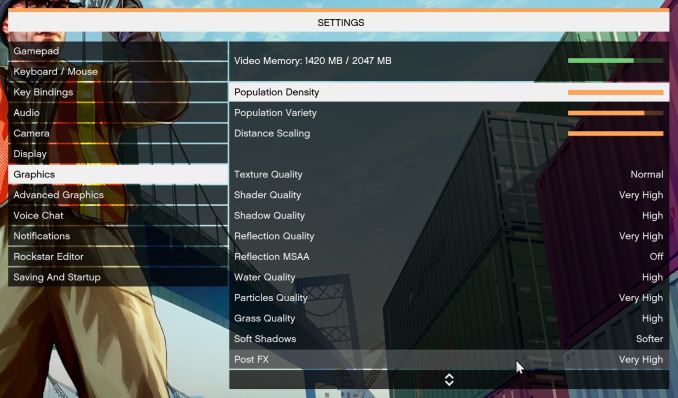The AMD 2nd Gen Ryzen Deep Dive: The 2700X, 2700, 2600X, and 2600 Tested
by Ian Cutress on April 19, 2018 9:00 AM ESTGrand Theft Auto
The highly anticipated iteration of the Grand Theft Auto franchise hit the shelves on April 14th 2015, with both AMD and NVIDIA in tow to help optimize the title. GTA doesn’t provide graphical presets, but opens up the options to users and extends the boundaries by pushing even the hardest systems to the limit using Rockstar’s Advanced Game Engine under DirectX 11. Whether the user is flying high in the mountains with long draw distances or dealing with assorted trash in the city, when cranked up to maximum it creates stunning visuals but hard work for both the CPU and the GPU.
For our test we have scripted a version of the in-game benchmark. The in-game benchmark consists of five scenarios: four short panning shots with varying lighting and weather effects, and a fifth action sequence that lasts around 90 seconds. We use only the final part of the benchmark, which combines a flight scene in a jet followed by an inner city drive-by through several intersections followed by ramming a tanker that explodes, causing other cars to explode as well. This is a mix of distance rendering followed by a detailed near-rendering action sequence, and the title thankfully spits out frame time data.
There are no presets for the graphics options on GTA, allowing the user to adjust options such as population density and distance scaling on sliders, but others such as texture/shadow/shader/water quality from Low to Very High. Other options include MSAA, soft shadows, post effects, shadow resolution and extended draw distance options. There is a handy option at the top which shows how much video memory the options are expected to consume, with obvious repercussions if a user requests more video memory than is present on the card (although there’s no obvious indication if you have a low end GPU with lots of GPU memory, like an R7 240 4GB).
To that end, we run the benchmark at 1920x1080 using an average of Very High on the settings, and also at 4K using High on most of them. We take the average results of four runs, reporting frame rate averages, 99th percentiles, and our time under analysis.
All of our benchmark results can also be found in our benchmark engine, Bench.
MSI GTX 1080 Gaming 8G Performance
1080p



4K
















545 Comments
View All Comments
RafaelHerschel - Thursday, April 19, 2018 - link
Hardware unboxed certainly did. It's a bit odd that you automatically assume that only Anandtech knows how to test.aliquis - Thursday, April 19, 2018 - link
If they don't rerun the tests with up to date software then they are useless.What I assume has happened here is some software, driver or firmware being "off" in the Anandtech review somehow.
RafaelHerschel - Thursday, April 19, 2018 - link
@Ryan Smith That is an excellent response.krumme - Thursday, April 19, 2018 - link
AT run bm at Jdec specs. 2666 for 8700k 2933 for 2700x. That and the security patches.Hifihedgehog - Thursday, April 19, 2018 - link
I was also totally misled. I came here first, only to find out after having misleading people online that this site’s results are completely off. I am a big AMD fan but these results need to be audited and corrected.Ryan Smith - Thursday, April 19, 2018 - link
"these results need to be audited and corrected."Validating right now.=)
stefanve - Thursday, April 19, 2018 - link
Clearly someone didn't apply his meltdown patch ....casperes1996 - Thursday, April 19, 2018 - link
Advice for the future:Don't be a prick.
Ian isn't lying to you. He's sharing the data his benchmarking showed. It being different to other reviewers is something he'll gladly look into, and is in fact looking into, but you ought to show yourself as a respectful individual when you point it out, otherwise you won't be listened to.
MadManMark - Thursday, April 19, 2018 - link
Hear, hear!bfoster68 - Thursday, April 19, 2018 - link
Chris113q,I did one for you since you seemed to be having issues.
If you read below they use a different methodology for estimating fps vs what AnandTech did in their review. the result is nearly the same. solid gains for AMD on a incremental upgrade. Was that so hard?
https://www.tomshardware.com/reviews/amd-ryzen-7-2...